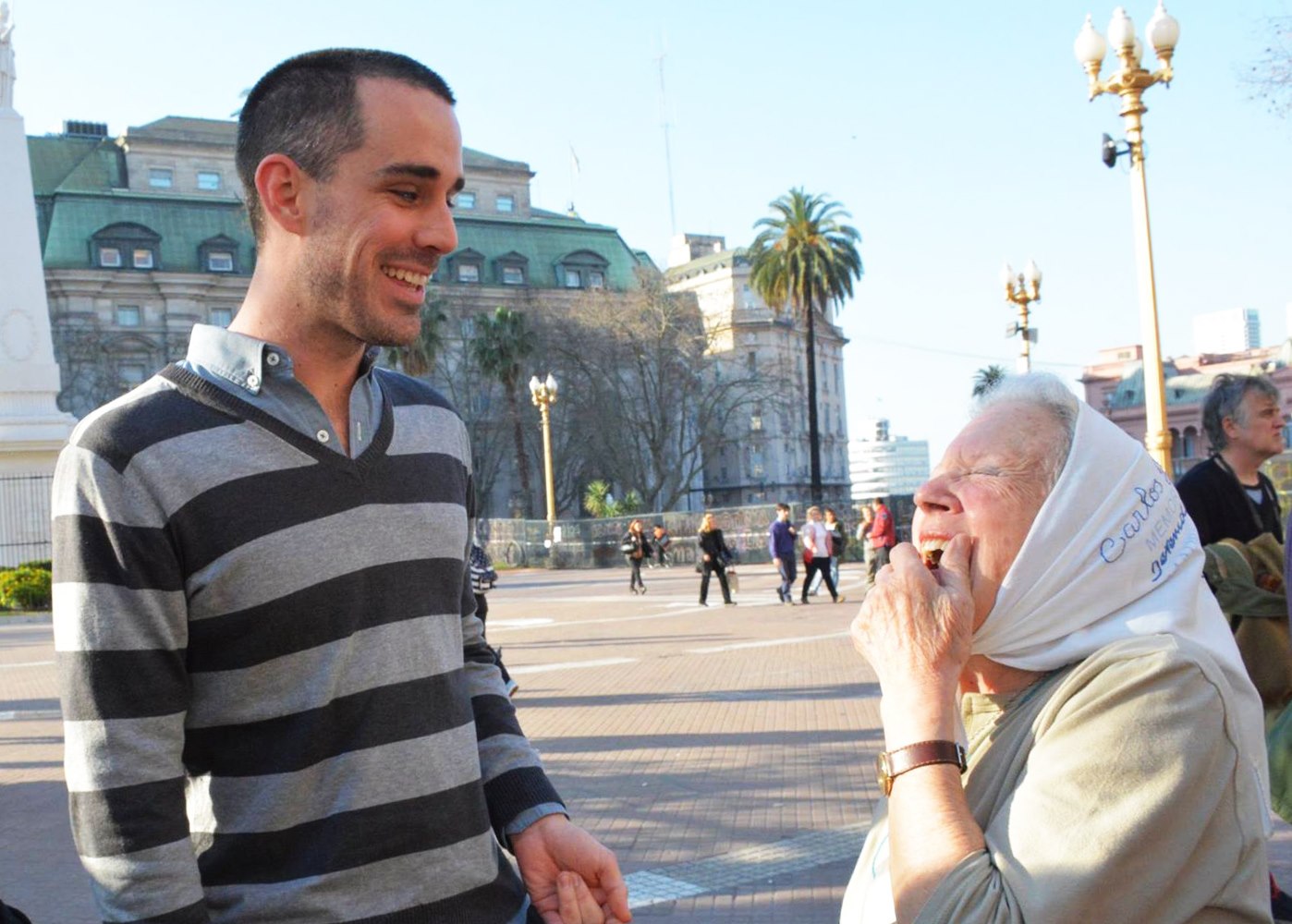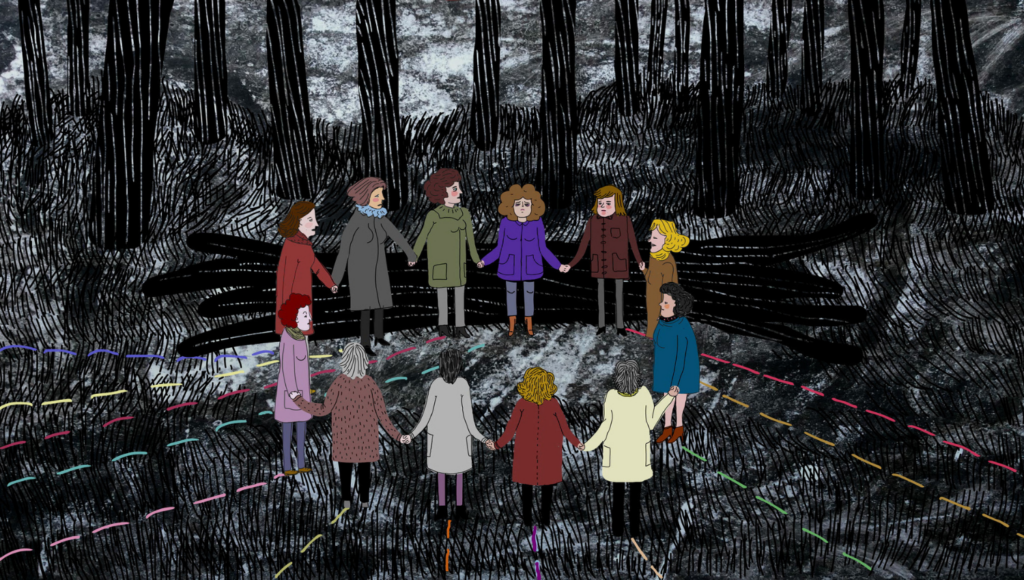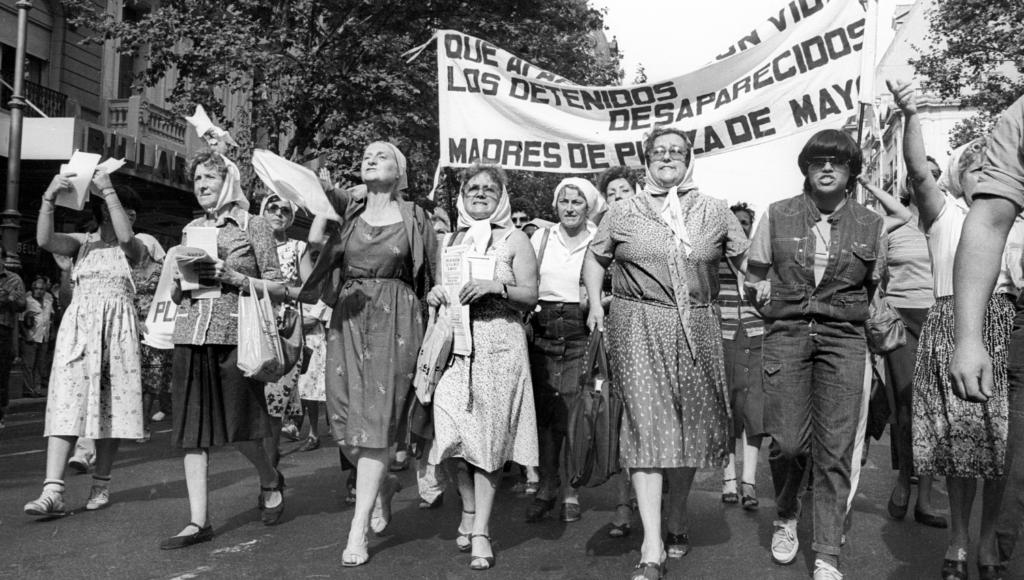
Jayson McNamara on ‘Norita:’ Exploring Activism and Resilience
James Brown
Norita is a somber testament to the quiet ferocity of a movement built on mother’s love. Co-directed by Jayson McNamara, Norita delves into the life of Nora Cortiñas, a founding member of Argentina’s Mothers of Plaza de Mayo, whose son’s disappearance under a brutal military junta ignited a decades-long fight for justice. McNamara, an Australian journalist turned filmmaker, approaches Nora’s story with an empathetic lens and sharp investigative rigor, weaving her grief into the broader tapestry of a nation’s reckoning with its past. In our interview, McNamara reflects on the delicate balance between telling a singularly powerful story and capturing the enduring scars of collective trauma.
JB: Good evening or rather good afternoon; it is afternoon there. Can you tell us what inspired you to create this film?
Jayson McNamara: I’m Australian but lived in Argentina for about eight years. Prior to making Norita, I’d done a documentary (Messenger on a White Horse) about the history of the dictatorship told through the experience of a British journalist named Robert Cox, who was the editor of the Buenos Aires Herald.
He had accompanied the mothers of Plaza de Mayo in their plight, which was essentially this group of amazing women, “housewives” who had stepped out of their four walls and gone looking for their children had been taken by the military in the 1970s. So I’d already had a connection to the story of the dictatorship, the story of the mothers of the missing.
I met Nora, the protagonist of Norita, in multiple contexts, and I was just enamored by her. Here was this really physically tiny woman doing mighty things. She just seemed like someone who was made for cinema; she’s very charismatic, very funny, and very emotional.
That was the start of it and then it’s been a long, almost seven-year journey to get the film finished.
JB: Oh, wow. I didn’t realize that. How did you develop the overall narrative of Norita?
Jayson McNamara: It was very much the product of the circumstances of us filming an active activist. A woman who, at the time we started filming, was involved in a number of causes.
She was busy out on the streets, and part of the main storyline, I guess you could say, is related to her involvement in the fight to legalize abortion in Argentina, which took place from 2018 through 2020. So, we were able to tie the history of the fight for human rights in Argentina with this emerging movement for women’s rights.
Norita sits at the center of both things. But we didn’t know that was going to happen. Just in the same year that we started filming, the women’s movement would pick up and fill the streets of Argentina with up to a million women.
So, it was very much circumstantial, as documentary often is.
JB: So this didn’t start as a story about finding her son and that struggle; it started more as a story about the activist, the modern activist that she became later in life.
Jayson McNamara: Exactly. We wanted to try to portray the life and times of a woman who was not the past, so to speak, a woman who was very much an activist of today. And that was really appealing at the time because a lot of people, especially in Western societies like ours, like Australia, like the United States, maybe not so much in Latin America, we can be quite dismissive of older people and their value in society.
I think Nora was close to 90 when we started filming her. Part of the reason why we wanted to show how busy and active and important she was also to say that older people have a very important role in activism, in political life, in decision-making, and in the dispute for common sense in our societies.
Nora was a perfect example of that. But inevitably, you can’t tell her story without looking back at where she came from. And it’s very interesting. We’re talking about a woman like the other mothers of the missing, the Mothers of Plaza de Mayo in Argentina. Most of them had no political experience.
They were in their late forties to early fifties when their children were kidnapped and taken by the military. So most of them, I guess you could call conservative Catholic, conservative Jewish women who really just violently injected themselves into the political space of their country. And they learned to become activists in their fifties.
There were so many angles to choose from, but we eventually found the right ones in plural.
JB: What cooperation did you get from the Argentine government?
Jayson McNamara: None, to be honest. That was partly a decision [made because] when we started making the film, Argentina’s economy was in decline.
We weren’t expecting to get any money from some of the funding agencies there, so we just did it independently. I took the film, in fact, to the U.S. as a project and was able to find really important allies. Some of our big-name EPs were quick to get on board. Producers Sarah Schoellkopf and Melissa Daniels are both California-based.
They’ve been fundamental for Norita to get over the line. We wanted it to be a project that transcended borders and language barriers and reached other people. Of course, in Argentina, there’s been a lot of political turbulence recently. So we tried as best as we could to separate the project from that so that we could actually get it finished and not be too reliant on any funding or support from Argentina.
JB: What other challenges did you have telling the story? I noticed at the beginning you used animation to handle some of the transitions. Was that a creative choice alone, or did you have problems finding archival footage or people to interview?
Jayson McNamara: Actually, the animation was one of the first stylistic decisions that was made. Even before we had finished filming and before we started editing, that gave rise to my collaboration with my co-director, Andrea Tortonese. She’s also the animator of the animated sequences. We actually had very specific conversations about how to avoid the animation filling up holes in the narrative.

We didn’t want that. I think animation and archive can sometimes be used to fill the voids in the documentation that you’ve done with your own filming, the lack of interviews, the lack of B roll. We really tried the best we could to avoid that. The product was that the film is very much structured around the animation.
First, the animation was put in place, and then we scripted it around the animation. An archive is not necessarily difficult to find in terms of the dictatorship in Argentina. The mothers—there were hundreds of Mothers of the Plaza de Mayo—and like Nora, they all wore their white headscarves.
Finding Nora in these images was an experience, but it’s challenging to tell the story of something so tragic and dark. So we put a lot of effort into finding the right tone and textures for the film, and I think we’ve achieved it.
JB: The right tone is definitely there. I appreciated this. I watch lots of documentaries, and they often over-deliver their messages. But I really think you’ve got a balance between the facts and the emotion down very well. So kudos to that. That was really well done.
I guess it’s still an emotional subject for the mothers. How many did you interview that didn’t make it into the documentary?
Jayson McNamara: We actually didn’t interview any of them. Part of the reason why we decided not to is that there are a lot of documentaries in Argentina about the history of the Mothers of Plaza de Mayo, and it’s very difficult to speak to them on a one-on-one level without going into their own personal stories.
We thought that maybe if we did that, it would be… I don’t want to sound cold, but they would be competing with Nora’s narrative as well. I guess the other factor here is that by the time we were putting the film together, a lot of them were already in their mid-nineties, and Nora is probably on the younger end of the mother’s age spectrum. So a lot of them have either passed or they’re not able to give interviews anymore.
"Part of the reason why we wanted to show how busy and active and important she was also to say that older people have a very important role in activism, in political life, in decision-making, and in the dispute for common sense in our societies."
So, what we did to include them, the sort of chorus of voices, and to make sure that we were representing the collective group as opposed to just Nora, was we found some old testimonies of theirs in the archive and included a couple of snippets of different mothers talking. But yeah, it was challenging.

Even Nora herself, when we were interviewing her, a lot of times she would talk in third person. So “we, the mothers, we did this, we did that, we wanted this.” That was quite challenging.
We wanted her to speak in the first person from her own experience and open up a lot more about the emotional side of things.
It was a bit of a challenge, but we, yeah, we’ve, we had to convince her that there was value in telling her individual story.
JB: So, you were living in Argentina at that time. At the time you started Norita, how has making this film impacted your understanding of Argentina’s past and Argentina today?
Jayson McNamara: I think that the remarkable thing about Argentina is that, give or take a couple of specific episodes in its recent political history and the sort of state violence, police violence, especially against poor people or protesters. Generally speaking, for a country that had such horrible political violence in the seventies, it hasn’t descended into chaos again in the same way; it’s built itself up from the ashes.
As an imperfect democracy, there are a lot of things that are going wrong in Argentina still, that’s undeniable. But there are some really strong democratic institutions and people believe in human rights as a core principle of the political system there, of the society, and of the culture.
Even when there’ve been attempts to deny the crimes of the dictators or to go backward in terms of judicial cases that are still ongoing, there are still military, former military, police, and civilians being tried and jailed in Argentina to this day.
Every time there’s been an attempt to undo that, society has said, no, this is our limit. We reject that. We say no to the crimes of the past. It’s a very impressive society in that regard, and I think by making a film that portrays Argentina today and Argentina 40 years ago, to the point of your question, you can see how well society generally has responded to what happened.
That gives me hope as an outsider. I think it’s a country that is probably heading in the right direction.
JB: I agree with that, especially the fact that they went back and had a period of atonement. A lot of countries, when they go through a tragic period, forget the past, and the people who suffered are still suffering and, no, don’t get the closure that they get.
Other countries do have reconciliation committees and tribunals, and they attempt to right past wrongs. I guess the surprise for me, and it was a humorous surprise– Maybe it wasn’t so funny at all– was that I didn’t realize that as the junta was leaving power, they passed a law giving themselves a blanket amnesty. That was subsequently undone. Were there any surprising revelations for you that emerged during the film?
Jayson McNamara: That’s a good question. I don’t know if there were because by the time I got to starting it, I think, in hindsight, I was pretty immersed and pretty well-read on everything. The junta was a very strange experience for Argentina. There were three generals ruling the country at the same time.
There was infighting. For example, the head of the Navy didn’t know what the Army was doing regarding the illegal underground kidnappings. The Navy didn’t know what the Army was doing. The Navy didn’t know what the police were doing.
So what seemed on the surface to be a regime held together quite tightly through violence was actually a bit of a motley crew, quite dysfunctional territorial mess that quickly unraveled. If you compare Argentina with Chile, Chile had Pinochet. Pinochet was in power, I think, almost for 20 years because that regime was centered around a strong man figure, whereas in Argentina, it was disastrous in every way.
Obviously, I’m not trying to relativize anything in terms of the crimes that were committed, which were particularly horrendous. They were destined to fail, but unfortunately, they took a lot of lives with them in that process.
JB: What type of audience do you hope Norita will resonate with the most? You’ve mentioned modern women and women’s rights movements and that movement. You’ve mentioned seniors. Who do you hope is going to resonate most with this film?
Jayson McNamara: It’s interesting. I don’t know if it sounds too ambitious, but I think that when you’re dealing with the story of mothers who lose their children, it’s such a universal idea. That relationship between mothers and their children…
There’s this beautiful phrase; I don’t know if it’s beautiful; they say that in English, we have a word for a person who loses their parent, that’s an orphan. You have a word for someone who loses their partner; that’s a widow, but there’s not a word in our language to describe what it means for a parent to lose a child. I think that says a lot about how deeply understandable it could be for anyone who is a parent or anyone who’s been loved by a parent to understand what the Mothers of Plaza de Mayo and Nora herself went through.
So I’m hoping that Norita resonates with] people beyond just the general demographic target audience. It plays out naturally when the film starts going to festivals and being seen; you start to get a sense of who’s responding to it. But I do hope that people can see beyond the identifiers, so to speak, and try to find resonance in the story.
I think it’s a very simple and powerful story that as many people as possible should see.
JB: I agree with that too. Where do you see Norita fitting into the landscape of documentaries in general, or at least the documentaries that are currently out there?
Jayson McNamara: Yeah, that’s a good question.
I think in a mainstream sense. There’s definitely been a boom and bust cycle in the period that we’ve been producing Norita, both in terms of the market and also the prominence of political or political-leaning documentaries; at one point, I think, for example, the streamers were really relying on political documentaries to get people interested in documentary again, in general, but now with the broader political context being so sensitive, I think some of these companies are being very cautious about what they put out there.
They don’t want to upset the apple cart when their businesses are involved in different industries and you have some very uncertain times coming up. I think political content is not convenient, but ironically, that presents an opportunity for the political documentaries that are coming out to actually fill in that hole in the market or that niche and maybe hopefully turn the tide on that process of political documentaries being sidelined.
I think Norita is, while it’s political or politically adjacent, it’s really just a human story. And I hope that it’s considered in those terms as well, not just as a political documentary.
